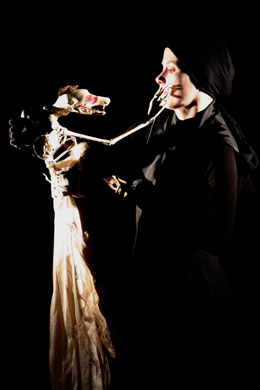Tara Notcutt is a director who, since her well-deserved Fleur du Cap award in 2009, has really been making a splash on the local theatre scene with her signature style of startlingly detail-oriented and often richly visual interpretations. With Mafeking Road – a piece that started life as her young directors’ bursary work of choice – things are no different.
With the aid of the ever-talented duo of Mathew Lewis (Lenny and the Wasteland) and Andrew Laubscher (Lovborg’s Women, Is it Because I’m Jack?), Notcutt takes us through the best of Bosman’s short stories from the perspective of that most loved of all South African narrators, Oom Schalk Lourens. Lewis and Laubscher seem to be having as much fun as we do, as they take us on a giddy gallop through the Groot Marico’s biggest social goings on. Whether you’re a longstanding fan of Bosman or a new convert, you’re going to love the ride.
Adapting one short story for the stage is a tough ask. Adapting a series, especially a series as intrinsic to the South African Afrikaaner psyche as Bosman’s, is a near-impossibility. Notcutt has taken some bold stylistic choices here that may have traditionalists somewhat taken aback, but which work a theatrical treat. Lewis and Laubscher work as a narrative team, channelling a music hall style of banter that is all the more humorous for its thick local flavour. Taking turns to play the coveted role of Oom Schalk, they keep up a playful, fast-paced energy that ensures the audience are right there with them in every adventure.
I particularly enjoyed the comic book style of narration where, stripped of any props, the pair play out the action using every ingenious application of physical skill possible: hands become characters, minutely playing out the action on the large-scale ‘set’ of an arm or back and sound effects are gleefully introduced at every turn. If it weren’t for the very adult talent on show, the pair would resemble nothing so much as gleefully overgrown schoolboys having a riotous storybook romp in an idle hour before supper. Mafeking Road is a reminder of how good a cracking tale can be…and why you don’t need big budget sets to win over an audience.
Mafeking Road has already toured to rave reviews at the Voorkamer Festival, the Grahamstown festival and, most recently, to the Groot Marico itself, for the Bosman Literary festival. You don’t have to get on your horse to see it this time around – it’s playing at the Intimate Theatre in town until 5 November. Go on – Oom Schalk is waiting.











